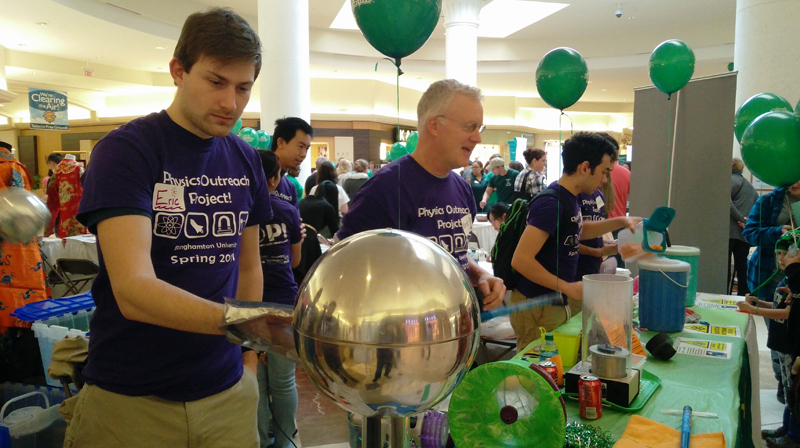Bringing science to the community
Student volunteers demonstrate concepts at Binghamton-area schools

Binghamton University students are making science sweeter at local schools, one ice cream cone at a time.
“The goal of the Physics Outreach Project is to introduce kids to science in a way that’s fun,” said Eric Haberli, a volunteer for the program and second-year graduate student studying education. “We end [our heat and cold show] with our crowd-pleasing liquid nitrogen ice cream, which tastes better than store-bought ice cream.”
The Physics Outreach Project (POP) brings science education in the form of hands-on activities and demonstrations to Binghamton schools, working with children ages 4 to 14. POP also participates in campus events such as University Fest and the opening of the Smart Energy Building. The group will take part at University Day at the Mall from 11 a.m.-3 p.m. Saturday, Feb. 24, at the Oakdale Mall.
According to Mark Stephens ’81, POP coordinator and lab specialist for the Physics Department, the program is special because of the dedication of its volunteers.
“I like seeing what the volunteers get out of this,” Stephens said. “That’s not something I teach.”
He also noted that the best volunteers are those who know nothing about physics and come from a variety of educational backgrounds.
According to volunteers like Ruba Khan, a freshman majoring in physics, the students who take part learn just as much as the children they teach.
“Every day I get to learn something new,” Khan said. “Giving people a chance to see how amazing physics is and that it’s not just boring theory; I think that’s very cool.”
Each week there are eight to 10 stations set up at elementary schools by volunteers to demonstrate concepts such as heat and cold, electric charge, electricity and magnetism, pressure and flow, motion and energy.
POP uses portable equipment that Stephens designed with pieces from the University’s physics labs. The children spend five to eight minutes at each station before moving to the next.
According to Jeremy Mehta, a graduate student studying physics and the graduate assistant for POP, this makes it easier for the volunteers to teach physics to children without science backgrounds.
“Our goal is to design experiments and demonstrations that make complex scientific concepts accessible to the masses,” Mehta said.
POP started out as a science club of about 50 students focusing on neuroscience, physics and chemistry. When Stephens got involved in the spring of 2009, he expanded the program with more active physics demonstrations.
Christopher Bishop, one of the club coordinators and a professor of psychology, said the original program encompassed about one-third of the students attending African Road Elementary School.
“In fact, there was a point when we had to cap it because we wanted to be sure that the groups were small enough where they still got individual attention,” he said.
It has since grown to having at least three schools in rotation per semester. Stephens calculated that POP puts in around 1,000 to 1,500 contact hours between volunteers and children per semester.
Bishop commended POP for developing material that engages students of all ages and instills a love of science.
“As the K-12 children understand it more, they actually remember it. So I think the hands-on along with the spiel that POP students put together that describes what’s happening — it starts to click for them,” he said. “The younger students learn the information by doing it. So I think it’s really critical in developing an interest in science early.”
For some of their lessons, Stephens and his volunteers capture the interest of their young audiences with exciting finales meant to leave lasting impressions.
“The reward that [POP] gets is through interesting people in science,” Bishop said. “It’s really what motivates [them]. And that’s real. That’s not a show.”
The POP volunteers get their satisfaction from seeing the wide eyes and bright smiles of the kids during their science demonstrations.
“The kids think we are superheroes,” Haberli said.
